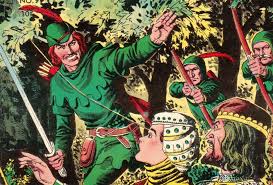HighKey
The real life Robin Hood isn’t an outlaw, it’s an app and it tells the story of class inequality better than ever before

Photo by Submitted
When I was younger, my mom used to read me the story of Robin Hood and his Merry Men. Unfortunately, my undiagnosed attention-deficit/hyperactivity disorder prevented me from sitting through the majority of the book, but I got the gist.
The tale tells a story of the heroic outlaw Robin Hood who lived in the woods of Sherwood with his Merry Men. He saw the injustices the poor experienced at the hands of the rich, so he took matters into his own hands. He decides to steal from the rich and give to the poor — Robin Hood does what the authorities won’t. He fights back.
Then there are a few sword fights and some archery battles, Robin Hood gets a girlfriend, yada yada yada. And this is the point where I started to daydream and didn’t hear the rest of the story.
But one part always stuck with me: “steal from the rich and give to the poor.” Whenever I heard the term “Robin hood,” that’s the first thing I would think of.
As I got older and became more political, I started to see the conflict of the story of Robin Hood in real life. I saw the rich taking advantage of the poor, I saw them cheat and find loopholes to screw over the disenfranchised.
But what was I gonna do? Go buy a silly green outfit with a matching hat and a bow and arrow? I thought about that, but Party City didn’t have a costume in my size.
Nonetheless, I remembered the story, but I hadn’t thought about it for a long time. That was, until a few weeks ago when I discovered the real life Robinhood.
Avid social media users have likely heard the words Robinhood, Reddit and GameStop in the last few weeks, but probably could care less about what all those words mean.
Well, very similar to the folklore of Robin Hood, I am about to tell a tale of greed, class war and revolution. But instead of sword battles, it’s fighting for stock shares, and instead of archery, it’s short selling and, unfortunately, instead of someone getting a girlfriend, it’s just a ton of stock market/business major vocabulary.
So here’s the deal — recently the stock price of the video game store, GameStop, skyrocketed by 8,000% in just six months.
In this day and age, stores like GameStop that sell products in person are quickly going out of business due to the mass use of online shopping, so most people would see GameStop stock as a bad investment.
Since GameStop appeared likely to go out of business, investors began to do something called short selling, also referred to as hedge funds. This is when investors borrow stock to sell with the intention of buying it back later, letting them make a profit if the company should go out of business. Basically, the investors are betting money that a company will fail.
This is where the Robin Hood story comes into play.
In the case of GameStop, a bunch of everyday people interested in stock trade who were all members of the same trading forum on Reddit called r/wallstreetbets, or WSB, noticed the trend that GameStop’s stock price was being shorted.
So, the members teamed up to buy up shares and drive up the price of GameStop’s stocks by using the app Robinhood, a sort of informal stock trading platform that lets people trade stocks at a low price.
This move left the hedge funds with few shares to buy, resulting in a short squeeze. This is when the rise in stock purchases makes the hedge funds, who bet on the company’s failure, start to lose a ton of money. This forces them to buy more shares to prevent losing any more profit.
Basically a bunch of Merry Men — WSB — with the help of Robinhood — the stock trading app — took from some rich folks — the hedge funds. Ah, irony is a beautiful thing.
S3 Partners, a data investment company, did an analysis on the monetary losses the short sellers suffered in the GameStop drama and found that the hedge funds lost $23.6 billion in just one month.
Never before has a union of inexperienced investors declared war on hedge funds and won. This left the billionaire hedge funds feeling a little bummed.
Hedge fund manager Michael Burry took to Twitter to state his grievances with WSB. He described the GameStop surge as, “unnatural, insane and dangerous,” and demanded, “legal and regulatory repercussions” in a since deleted tweet.
While some *cough* *cough* billionaire investors *cough* saw this as “cheating,” others quickly noticed the double standard.
U.S. Representative Alexandria Ocasio-Cortez tweeted about the hypocrisy following the GameStop frenzy.
“Gotta admit,” she said in the tweet, “it’s really something to see Wall Streeters with a long history of treating our economy as a casino complain about a message board of posters also treating the market as a casino.”
While the gains from GameStop shares may not be permanent, it shows that united action can make a difference. It can even knock rich, white billionaire goliaths down.
Hinrichs can be reached [email protected]

Allison Hinrichs is a third-year journalism and multimedia communication student. This is her fourth semester at The Spectator. Allison loves being outdoors and anything that gives her an adrenaline rush. She loves hiking, rock climbing, snowboarding and photography.
